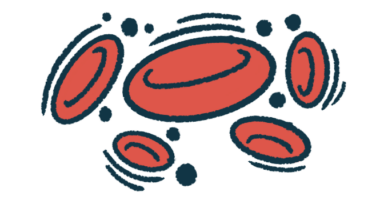Soliris effective in PNH when properly prescribed: Study
Therapy acts as a complement inhibitor to reduce red blood cell destruction

Most people with paroxysmal nocturnal hemoglobinuria (PNH) benefited from Soliris (eculizumab) therapy when they adhered to strict treatment guidelines, a real-world Dutch study showed.
Because most had an incomplete response, new therapies are needed to improve real-world outcomes, however, the study’s researchers suggested, and emphasized that their data could be used to compare real-world outcomes of Soliris with similar medications.
The real-world study, “Nationwide study of eculizumab in paroxysmal nocturnal hemoglobinuria: evaluation of treatment indications and outcomes,” was published in the European Journal of Haematology.
PNH is a rare disease caused by acquired (noninherited) mutations in the PIGA gene, which leaves red blood cells vulnerable to an immune-mediated attack and destruction (hemolysis). A hallmark of the condition is anemia, or low red blood cell levels, making fatigue one of its prominent symptoms.
PNH can be treated with Soliris, an approved antibody-based therapy designed to block C5 — a protein of the complement cascade, which is part of the immune system that normally helps fight off disease-causing microbes. In PNH, the complement system targets red blood cells.
Soliris — developed by Alexion Pharmaceuticals, which was acquired in 2021 by AstraZeneca — acts as a complement inhibitor to reduce the destruction of red blood cells.
Despite its demonstrated effectiveness, Soliris can increase the risk of life-threatening infections and requires regular and lifelong intravenous infusions because interruptions could trigger severe breakthrough red blood cell loss. The medicine has a high cost. In the Netherlands it’s about €325,000 to €433,000 (about $346,000-$461,000) per patient a year, depending on the dosage.
Results of Soliris treatment for PNH patients
The Netherlands has implemented strict criteria for Soliris in PNH. Eligibility includes evidence of dependency on red blood cell transfusions, PNH-related blood clotting (thromboembolic events), kidney failure, pregnancy, severely impaired quality of life (QoL), and pulmonary hypertension, or high blood pressure in the blood vessels that pass through the lungs. These guidelines coincide with those in other countries, including the U.K., said the researchers, who evaluated its real-world use across the country to “improve our strategy for proper patient selection” and optimize its effectiveness in the Netherlands.
The researchers collected and examined data from 105 patients (55 females), ages 13-85 when they started Soliris (median, 43 years). In total, 95 patients (90%) received Soliris for at least a year, with a median duration of 4.4 years.
Soliris was prescribed to 50 patients for anemia-related severely impaired QoL, to 38 due to transfusion dependency, to 31 with PNH-related blood clots, 10 for pregnancy, eight with kidney impairment, and one for complications from a stem cell transplant. It was initiated for more than one indication in 28 patients.
After 12 months of therapy, 23.4% of patients achieved a complete red blood cell (hematological) response, a normal levels of red blood cells); 53.2% had a good or partial response; and 23.4% had a minor response. In most, this response remained stable during long-term follow-up.
Among those who began Soliris due to transfusion dependency, 6.1% reached a complete hematological response, 45.4% a good or partial response, and 48.5% a minor response after 12 months.
LDH, a marker for red blood cell destruction, significantly decreased at six months and 12 months compared with pretreatment.
A total of 71 breakthrough hemolytic events were reported in 35 patients (40%) with Soliris, most of which were due to infections (57 events), but also labor, COVID vaccination, surgery, gallstones, persistent nausea and vomiting during pregnancy, gout, and blood clots.
Before treatment, 14 patients (14.7%) had evidence of kidney impairment, as measured by the estimated glomerular filtration rate, a standard indicator of kidney function. With Soliris, kidney function improved after six and 12 months, with no occurrences of kidney failure. However, it didn’t improve kidney function among those with chronic kidney disease.
Blood-clotting events were reported in 37 patients (35.2%) before Soliris. With treatment, seven developed mild blood clotting. Clotting occurred in three treated patients despite additional anticoagulant therapy.
Regarding survival rates, 11 patients (10.5%), ages 64-94, died on Soliris, representing a five-year survival rate of 92.7%. Most deaths occurred due to non-PNH causes. None were due to meningococcal infections.
Patient-reported outcomes on QoL and fatigue showed significant improvements in physical, emotional, and cognitive functioning during treatment. There was a significant and clinically meaningful improvement in fatigue as well as in physician-reported Karnofsky scores, which measures daily performance/functioning.
There were 18 pregnancies in 12 females. Soliris was started during 10 of those pregnancies, while eight others were conceived under therapy. Sixteen pregnancies (88.9%) resulted in live, single births, while two (11.1%) resulted in early spontaneous abortions. No stillbirths occurred, and no congenital abnormalities were seen in the newborns.
The researchers said their study shows most patients benefit when they adhere to the “indications as formulated in the Dutch PNH guideline.” They said new treatments are needed to further “improve real-world outcomes, such as hematological responses and quality of life.”







